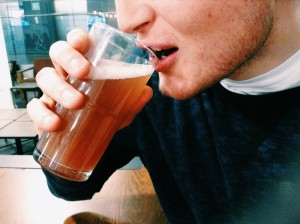
Britain’s ‘boozing cities’, including Liverpool and the Wirral, were named and shamed by Labour MP Liam Byrne during last week’s Prime Minister’s Questions.
Although other areas were reported to be suffering more with the issue nationwide, Merseyside featured in the statistics.
The report by Local Alcohol Profiles for England, listed the Wirral as the 20th ‘worst place across the country for dangerous drinking’ – with Liverpool 28th on the list.
Byrne, the former Chief Secretary to the Treasury, said in Parliament: “Booze abuse costs Britain a staggering £21 billion a year, these shocking figures expose just where the UK’s biggest problem is.
“We’ve got to now make councils and health chiefs have plans in place to put treatment in reach of drinkers needing help, no one should suffer with alcohol addiction alone.”
From the research, Merseyside has seen an increase in alcohol-related hospital admissions for adults. Most cases involve males who are diagnosed with cardiovascular disease and liver disease, resulting in more deaths per month.
Dave Evans, Liverpool Health Liaison Officer for Alcoholics Anonymous (AA), has been sober for 14 years. He has seen dramatic changes in his life due to addiction losing six of his friends to alcoholism.
Evans told JMU Journalism: “Everyone has a different story to tell but everyone can relate to the dangers of alcohol. My drinking was like a pebble hitting water causing waves, these waves rippled and effected the people in my life. Forty people were hit by these waves.”
The 58-year-old, who was a Merseyside Police Officer for 30 years, said: “Coming to the AA brought me comfort, talking to people who knew what I was experiencing. I didn’t feel alone when I was with them. The AA saved my life from ending up in the Royal Hospital. I always felt welcomed, a sign of affection is what I needed and altruism is what I got.”
Evans believes that Merseyside can change its alcohol issue through education with young people and adults, including taxation on off-licences that causes people to drink in isolation which sparks the growing addiction.
Julie Kinsella-Shenton, North West Regional Communications Manager for Public Health England, told JMU Journalism: “Alcohol-related problems continue to be widespread in England with nine million adults drinking at levels that increase their risk of diseases such as high blood pressure, diabetes, some cancers and depression.
“We will continue to work with national and local partners to promote measures to reduce harm, raise awareness of the harms, and promote good effective local interventions and treatment including specialist hospital services for all who need them.”

